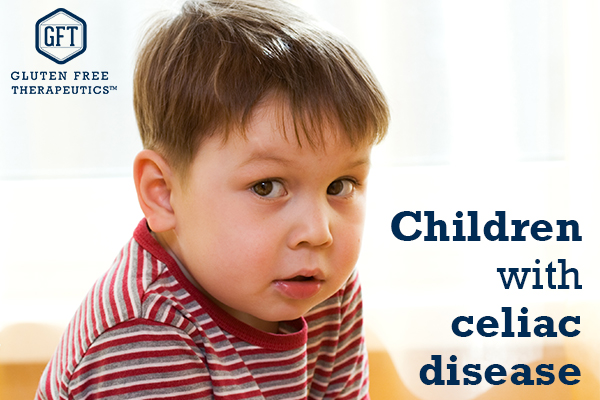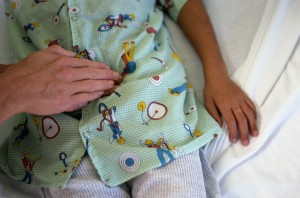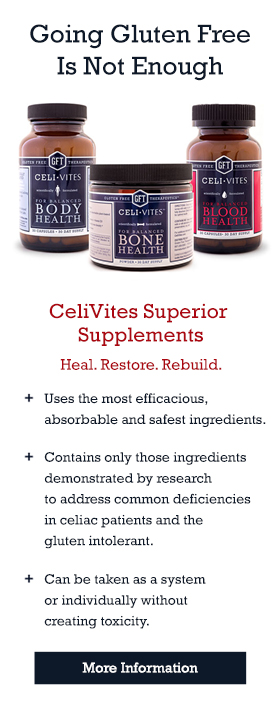
Pediatric Celiac Disease is Difficult to Diagnose
Children with celiac disease often have elusive symptoms
Celiac disease affects children as well as adults, and recent studies suggest the disease may be much more prevalent in children than previously thought. That’s because celiac disease tends to present a little differently in children, making a diagnosis more problematic in many cases. In addition to the gastrointestinal symptoms that arise from the gluten reaction, other organs can also be involved. When not detected early in children, the malnutrition that occurs with celiac disease can create lifelong effects including weak bones, stunted growth and even learning disabilities. What’s more, in some children the disease may be “silent,” causing no traditional gastrointestinal symptoms to cause parents and doctors to be suspicious that the disease may be present.
A study from researchers at the University of Maryland defines “classic” CD as disease that typically begins between six and 24 months of age, resulting in chronic diarrhea, abdominal bloating, poor appetite and irritability or moodiness, followed by poor growth and, eventually, weight loss. By contrast, the “non-classical” form of pediatric CD typically manifests between five and seven years of age, causing vomiting, recurrent belly pain, constipation, nausea and bloating, as well as symptoms like shorter stature, defects in the dental enamel, dermatitis herpetiformis, iron deficiencies and even abnormal liver function.
The same study notes delays in diagnosis may be due in part to the fact that many insurance companies do not cover the costs of intestinal biopsies to diagnose pediatric celiac disease and that testing methods among pediatric patients may be inconsistent.
The Journal of Pediatric Gastroenterology and Nutrition has endeavored to make diagnosis a little easier by publishing guidelines specifically aimed at the pediatric population. Here’s what they recommend:
- CD should be an early consideration in differential diagnosis for children who demonstrate symptoms of failure to thrive (FTT), persistent diarrhea, recurrent belly pain, constipation and vomiting.
- Testing for CD should be conducted in children with non-GI symptoms like dental enamel problems, bone density issues, short stature, delayed puberty, dermatitis herpetiformis, type 1 diabetes, Down syndrome, autoimmune thyroiditis, Williams syndrome, Turner syndrome and selective IgA deficiency, as well as those with first-degree relatives with CD.
- Testing for patients in the above group should begin at three years of age and repeated at regular intervals if initial tests are negative since the disease may develop later on.
A 2010 Danish study found a simple questionnaire could help identify kids most at risk for having celiac disease. These are the questions they suggest parents consider if they suspect their child may have CD:
- Is your child growing and gaining weight normally?
- Has your child ever had diarrhea for a period exceeding two weeks?
- Does your child often have firm, hard bowel movements?
- Has your child had belly pain more than twice in the past three months?
If the answer to any of these questions is yes, ask your child’s pediatrician about conducting a blood test to diagnose CD.
As your child’s advocate, you can help ensure your child gets the tests he or she needs to be properly diagnosed by talking with your doctor about emerging studies that suggest more children have undiagnosed celiac disease than previously suspected.
This original article is made possible by Gluten Free Therapeutics. Our mission is to educate, inform, and provide the most effective nutritional products possible to allow those with celiac disease and serious gluten intolerances to heal their bodies. CeliVites complete line of superior gluten free supplements includes multivitamin/multimineral supplements, iron supplements, and calcium supplements for people living with celiac disease. All CeliVites products are designed to help you heal, restore and rebuild your body, because going gluten free isn’t enough!
Comments ()

















Our grandchild was seen by Children’s Hospital and was diagnosed with CD because of underweight, constipation, belly paid, nausea, tempertantrums, very thin hair, no concentration in school. It was going on since age 2. It lasted until he was diagnosed at age 7. He is much better now.
My 13 year old daughter with Down Syndrome was diagnosed with CD over a year ago. She had such extreme anemia which lead to the diagnosis…wish I landed on your website at that time. Are your vitamins safe for her to take?
Carrie, We are glad you found us as well. It is not unusual for iron deficiency anemia to be the gateway to a celiac diagnosis. See our article about anemia to learn more. We always suggest that our customers take our supplement fact information to their doctors for approval if needed. Please take the time to read the ingredient tabs for the Blood Health. There you will see a detailed explanations of each ingredient, what it does and why we added it. When looking for an iron supplement it is important to know that all iron is not alike. Some forms can cause stomach and digestive issues. Ours is specially designed for celiac patients to be gentle and highly absorbable. We wish your daughter good health and thank you for your question.
It’s difficult to diagnose because many doctors like our previous pediatrician want the easy diagnosis like autism or ADHD. Our son was 2 when his terrible symptoms started (behavior was very erratic, angry, no concentration, light and sound sensitivity and a whole host of other things). He wore a 3T for 3 years and our pediatrician at the time still wanted to say he was autistic…. She was so far off. He was not dx’d until right before age 7. So, it took 5 years and I gave up on MD’s. Took him to an alternative practitioner who found it on his 2nd visit! (4 weeks is all it took) After waiting for someone with MD after their name for over 5 years to figure it out. His GI was wonderful, but he his digestive tract was a complete mess. He was so sick…. I don’t have a lot of faith in traditional medicine after this horrible experience. My son is 13 now and is 5’6 and 130 pounds with a man’s size 12 shoe. He does have some issues thanks to the malnutrition to his brain during the 5 years that physicians passed him around and did nothing. He is doing way better, but does need additional assistance with school due to some of his challenges. We still hope that these will diminish as he continues to be healthy and keeps developing further.
Have four grandchildren out of five who have celiac disease. An uncle contacted me when he found out he and several of his grandchildren were diagnosed. Every one manifested in different way from the other: hives with negative allergy tests, stomach aches, eczema, bone breaks etc. I caution one of the children is quite tall so “smallness” is not always the only “sign”.
I have celiac first when I was 6 months old. Then it got really bad when I was 39 years old .. Now at age 61 I have had to deal with lots of medical problems and a few times not sure I was going to make it. Finding out more now that there is more onCD a lot is from it.
As a retired nurse I feel that every child should be tested at age 3 as a normal lab work. That way they will not have life long problems. Now that there is so much more information why not use it and save the kids from having problems when parents really do not know about this disease unless there child has been tested.. It is like the hidden disease. Because it can show as one thing and be something else.. Please get every GP, PA, ARNP and MD to test children seeing that they will be given wheat in one why or an other that the parents do don’t know that it is in there .. Like modified food starch , or starch modified lol.. So please add it to there routine check up like there shots to have blood work CBC low iron just add a simple blood test of Celiac Disease. Thank u
My son had been presenting symptoms since gluten was first introduced in his diet. It wasn’t until he turned 8 that I finally got a doctor to listen to me and test him for Celiac. He was 8 years old and had never had a normal poop, still wearing size 4T clothing, and with a constantly bloated stomach. I took him to about 7 different doctors in that time to try and get him some help but nothing. I was always made to feel like I was paranoid. After he got the positive diagnosis we tested our other two children and they also have Celiac.
Alexandra,
Thank you for sharing your experience with the group. It is a shame that you had such a difficult time getting your son’s diagnosis. But alas not an unusual story for both children and adults. Congratulations on having the insight to have all of you children, such an important step that many leave out. We wish your family the best.
I just need answers. My son has never had a normal BM in his life and he will be 8 in September. When he was still potty training he would have BM’s that were rock hard and in large balls. We were told he had a dairy intolerance so we had him tested and he did have a small milk allergy, so his PEDS put him on Miralax at age 2 and he’s been on it ever since. His growth has not been affected but he has terrible stomach pain, constipation, muscle and joint pain, a broken arm, tooth enamel problems as a baby, skin rashes, etc. We are going back to his PEDS on Tuesday but I am preparing myself for the same results. I feel that a lot of people feel that I am just trying to see as problem that isn’t there. But they don’t get up with him in the night when the leg pains are so bad he is begging me to make them stop. Or sit on the bathroom floor for hours talking to him just so he can try and have a BM. I feel so helpless. This is not normal. Something is wrong and I just want to know so I can control his symptoms.
Kara, It sounds like you are a great mom who is just trying to use the medical support you have to find answers. This is exactly what you should be doing. You may want to ask his pediatrician if he would suggest or agree to putting your son on a gluten-free diet to see if his stomach issues improve over time. Most foods that are good for us are gluten-free. Fruits, vegetables, and meats are all GF when they are not processed. Just try to buy organic if you can. You may want to try it, if you see an improvement in a months time you could pursue testing options with his doctor. This is just a thought and is not meant to be a suggestion that is done without your doctor’s consent. We wish you the best of luck with your son.
Is any parents and professional here who help me my child is diagnosed CD I am form Pakistan.. Pakistan have no any good facilities and guidance for parents and child both I’m very worries for my child his condition is not good plz contact me
03365900769